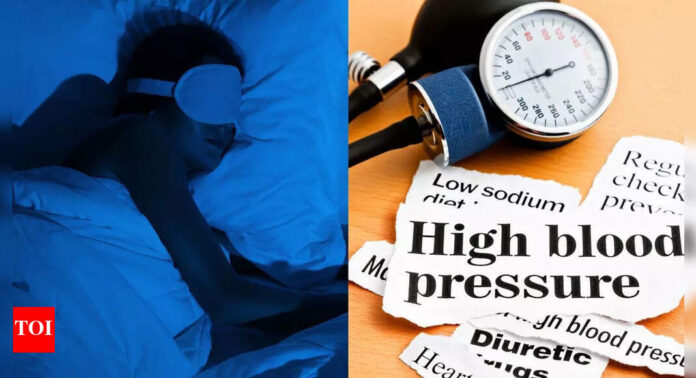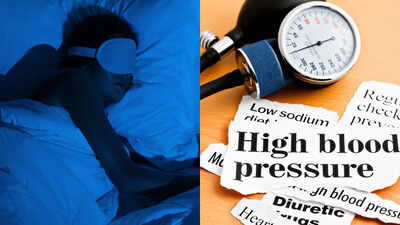High blood pressure is often seen as a daytime problem, but many people experience spikes at night without realising it. This condition, known as nocturnal hypertension, can be more harmful than daytime high blood pressure because it frequently goes undetected. Normally, blood pressure follows a natural rhythm and dips during sleep, giving the heart and blood vessels time to rest. However, in some individuals, it stays high or even rises, putting extra strain on the cardiovascular system, kidneys, and brain. Recognising the causes, learning how to detect night-time spikes, and seeking proper treatment are essential for protecting long-term health.
What causes night-time blood pressure spikes : Understanding nocturnal hypertension
Nocturnal hypertension
Nocturnal hypertension refers to elevated blood pressure during sleep, or a pattern in which BP does not dip (“fall”) as it normally should overnight. In healthy people, blood pressure follows a circadian rhythm: higher during waking hours, lower during sleep. This natural drop is known as the “dipping pattern.”
When this normal dip does not happen, or blood pressure even rises during sleep, it signals a problem:
- Non-dipping: blood pressure remains high with little or no reduction at night.
- Reverse dipping: blood pressure is actually higher at night than during the day.
Because it develops silently and rarely causes obvious symptoms, nocturnal hypertension is often only detected through specialised monitoring such as 24-hour ambulatory blood pressure measurement.
Causes of blood pressure spikes at night
There are several possible reasons why blood pressure may rise during sleep:1. Sleep disorders
- Obstructive Sleep Apnoea (OSA), which causes repeated breathing pauses during sleep, is a leading cause of nocturnal hypertension.
- Insomnia, restless nights, and poor sleep quality can also contribute.
2. Evening lifestyle habits
- Eating large or salty meals late at night.
- Drinking alcohol, coffee, or energy drinks close to bedtime.
- Smoking before sleep or experiencing high stress.
3. Medical conditions
- Diabetes, kidney disease, and certain hormonal imbalances can cause elevated nighttime blood pressure.
- Ageing also increases the likelihood of abnormal blood pressure patterns.
4. Medication factors
- Blood pressure medications may wear off overnight.
- Missed doses or incorrect timing of treatment can leave blood pressure uncontrolled while sleeping.
Why night-time blood pressure spikes are dangerous
Night-time high blood pressure is not just a number on a monitor; it carries significant health risks that can be even more serious than daytime hypertension. When blood pressure stays high during sleep, the body loses its natural recovery period, leaving the heart and blood vessels under constant strain. Research shows that over time, this can lead to a wide range of complications.Key risks of nighttime hypertension1. Increased risk of heart attack and strokeA study published by the University of Oxford shows the heart and arteries never get the chance to rest properly, which accelerates the damage to blood vessels, making clots, blockages, and strokes more likely. 2. Greater chance of developing kidney diseaseThe kidneys depend on healthy blood flow. The British Heart Foundation states that elevated blood pressure at night can damage tiny blood vessels inside the kidneys, leading to chronic kidney disease or worsening existing kidney problems.3. Thickening of the heart muscle (left ventricular hypertrophy)Constant pressure overload forces the heart to work harder, causing the walls of the heart to thicken. A study published in PubMed shows this reduces efficiency and raises the risk of heart failure.4. Silent progression of diseaseBecause most people only measure their blood pressure during the day, these nighttime spikes often remain hidden. By the time symptoms appear, significant damage may already be present.5. Damage to blood vessels (endothelial dysfunction)Continuous nighttime pressure injures the inner lining of arteries, leading to stiffness, hardening, and a faster build-up of fatty plaques.6. Worsening diabetes and metabolic healthHigh blood pressure at night is closely linked with insulin resistance, making blood sugar harder to control and increasing the risk of type 2 diabetes complications.
Diagnosing night-time hypertension
Daytime home readings or clinic measurements often miss nocturnal blood pressure spikes. More accurate methods include:
- 24-Hour Ambulatory Blood Pressure Monitoring (ABPM): a device worn for a full day and night to track patterns continuously.
- Sleep assessment: looking for signs of sleep apnoea, poor sleep quality, or insomnia that may contribute to blood pressure changes.
- Risk review: assessing kidney function, diabetes status, and cardiovascular risk factors alongside blood pressure readings.
ABPM is considered the gold standard for identifying non-dipping or reverse-dipping patterns.
Treatment and management of night-time blood pressure spikes
Managing blood pressure spikes at night requires a combination of lifestyle changes and medical care.
- Maintain a regular sleep routine and aim for 7–8 hours of rest.
- Avoid heavy, salty meals, alcohol, caffeine, or nicotine in the evening.
- Manage stress and reduce screen time before bed.
- Adopt a heart-healthy diet, reduce salt intake, and stay active during the day.
- Lose excess weight if overweight and manage underlying health conditions.
- Treat underlying sleep disorders, especially sleep apnoea, which can significantly improve night-time blood pressure control.
What to do if you suspect nighttime blood pressure spikes
If you experience morning headaches, poor sleep, daytime fatigue, or have normal daytime readings but still feel unwell, you may be experiencing nocturnal hypertension. Steps to take include:
- Speak to your GP about your symptoms.
- Request a 24-hour ambulatory blood pressure monitor.
- Keep a sleep diary to track disturbances and habits.
- Improve evening routines and limit stimulants before bedtime.
- Get tested for conditions such as sleep apnoea or kidney disease if at risk.
Disclaimer: This article is for informational purposes only and does not constitute medical advice. Always consult a qualified healthcare professional before making any changes to your health routine or treatment.Also read | Fish oil omega-3 supplements linked to lower dementia and Alzheimer’s risk: Study


